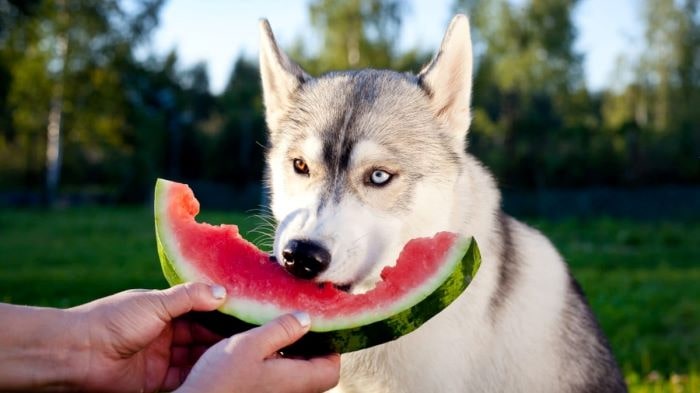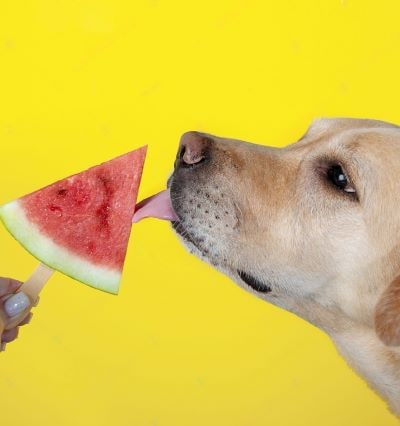Watermelon is a sweet and juicy summer fruit that is loved by humans and dogs alike. It’s easy to understand why dogs are attracted to watermelon; it is crisp, refreshing and packed with essential vitamins and minerals that are beneficial to their health. But can dogs eat watermelon? And, if so, what are the benefits and drawbacks of feeding it to them?
In this article, we will delve deeper into the topic of watermelon and dogs, exploring the pros and cons of feeding this fruit to our furry friends.
Can Dogs Eat Watermelon?

Watermelon is a nutritious treat for dogs, as it is low in calories and high in vitamins and minerals. It also acts as a great source of hydration, making it an excellent summertime snack for dogs. The juicy and sweet fruit can also help keep dogs cool on hot days.
But is it safe for dogs to eat watermelon? The answer is yes, dogs can safely eat watermelon in moderation.
Benefits of Feeding Watermelon to your Dog
Watermelon is a low-calorie, high-nutrient fruit that can provide several health benefits for dogs. Here are some of the benefits of feeding watermelon to your dog:
Hydration:
Watermelon is made up of 92% water making it an excellent source of hydration for dogs. This is especially important during hot weather or after physical activity when dogs are more prone to dehydration. The high water content of watermelon can help keep your dog hydrated and feeling refreshed.
Low In Calories:
Watermelon is low in calories, making it a great treat alternative for dogs who need to maintain a healthy weight.
Vitamins and Minerals:
The vitamins A, C, and B6 as well as potassium and magnesium are all abundant in watermelon. The immune system and general health of a dog can be strengthened by these nutrients.
Antioxidants properties:
The high levels of vitamin C in watermelon can help protect dogs against cellular damage, which is important for maintaining their overall health and preventing chronic diseases.
Aids in Digestion:
Watermelons are rich in fibre and can help regulate a dog’s digestive system and prevent constipation.
Drawbacks of Feeding Watermelon to Your Dog
While watermelon can be a healthy treat for dogs in moderation, there are some drawbacks to consider. Here are some of the drawbacks of feeding watermelon to your dog:
Indigestion:
Feeding too much watermelon can lead to indigestion and upset stomachs in dogs. This can cause symptoms such as diarrhoea, vomiting, and bloating. According to the American Kennel Club, if dogs swallow these watermelon seeds, the seeds can cause an intestinal blockage — which is not only painful for your dog but could become serious enough to require surgery to correct.
Choking hazard:
The seeds in watermelon can be a choking hazard for dogs, so it is important to remove them before feeding.
Excess sugar content:
Although watermelon is low in calories, it does contain natural sugars. Feeding too much can lead to weight gain and dental problems.
In the end, answering the question of whether dogs can eat watermelon, giving your dog watermelon in moderation might be favourable as it has numerous health benefits. So, can dogs eat watermelon?
The answer is yes, but it’s crucial to keep in mind that watermelon should only be provided as a treat and not as a substitute for a healthy diet.
The best advice for pet owners wondering “can dogs eat watermelon” would be to speak with your veterinarian if they have any reservations about giving watermelon to their dog.
While watermelon is healthy for dogs in moderation, some owners wonder if other food like asparagus is safe or not. For more tips on can dogs eat asparagus check out our guide.
How to Serve Watermelon to Your Dog?

Watermelon can be served in many ways to make it more delicious and intriguing for your dog. Some of the methods include:
Fresh Slices:
Cut the watermelon into small, bite-sized pieces and remove the seeds and rind without fail. Offer the juicy flesh as a treat.
Frozen bites:
Freeze watermelon slices or blend the fruit into a slushy mixture and serve as a frozen treat on hot days.
Blend with other fruits:
Blend watermelon with other fruits, such as blueberries or strawberries, to create a nutritious and tasty fruit salad.
You can also blend watermelon with soft fruits like kiwi to create a nutritious fruit smoothie, as long as you know dog eat kiwi safely.
No matter how you serve your dog watermelon, it’s crucial to feed it in small portions. Watermelon shouldn’t substitute a balanced meal for your dog; it should only make up a minor portion of their diet.
FAQs
How much watermelon can I give my dog?
According to petmd, healthy treats like watermelon also should only make up to 10% of your dog’s overall diet. The other 90% should come from a well-balanced dog food diet. One cup of diced watermelon is enough for a large dog. Small dogs will be fine with a couple of small pieces.
Can watermelon give dogs diarrhoea?
Too much of any one treat—including watermelon can cause upset stomach, constipation, diarrhoea, or even obesity and diabetes long-term.
Are watermelon seeds safe for dogs?
Watermelon seeds are not easily digestible and can cause intestinal blockages if ingested in large quantities. It is always advisable to remove the seeds before feeding watermelon to your furry friend. If the above instructions are not followed, too much watermelon can lead to diarrhoea and other digestive issues in dogs.
Can dogs eat watermelon rinds?
Watermelon rinds are not toxic to dogs, but they can be difficult for them to digest and may cause digestive upset, such as bloating, gas, and diarrhoea. It’s best to avoid feeding watermelon rinds to dogs and stick to feeding them only small pieces of the fleshy part of the fruit. If your dog has swallowed a watermelon rind, visit your veterinarian immediately.
Conclusion
Can dogs eat watermelon? Yes, watermelon can be a refreshing and healthy treat for dogs, but it should be given in moderation and without the rind or seeds. As always, it is best to consult with your veterinarian before introducing any new foods to your dog’s diet.
While watermelon is safe for dogs to eat in moderation, owners may also wonder about other fruits, like can dogs have blackberries?
References:
- Watermelon Production – Oklahoma State University. (2017, February 1). Retrieved February 7, 2024, from https://extension.okstate.edu/fact-sheets/watermelon-production-2.html
- Dixie Sandborn, Michigan State University Extension. (2019, March 7). Growing fruits and vegetables for your dog. 4-H Companion Animals. Retrieved February 7, 2024, from https://www.canr.msu.edu/news/growing-fruits-and-vegetables-for-your-dog
- Staff, A. (2022a, March 24). Fruits and Vegetables Dogs Can or Can’t Eat. American Kennel Club. Retrieved February 7, 2024, from https://www.akc.org/expert-advice/nutrition/fruits-vegetables-dogs-can-and-cant-eat/
- Nick. (2022, December 30). US service animals – can dogs eat watermelon? summer fun with your dog. US Service Animals Blog. Retrieved February 7, 2024, from https://usserviceanimals.org/blog/can-dogs-eat-watermelon/



